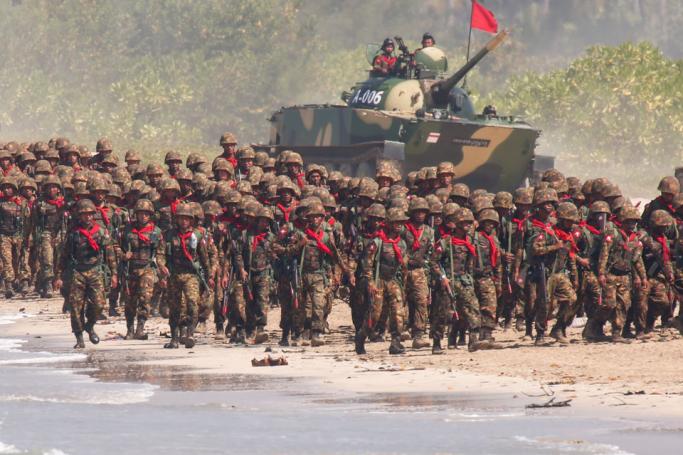Myanmar's military has lavished tens of millions of dollars on the latest lethal hardware, leaning on allies as part of a strategy to become a first-class fighting force.
The spending spree comes despite enduring EU and US arms embargos and calls earlier this month from a UN fact-finding mission for the international community to sever financial ties to Myanmar's military.
Senior generals already face sanctions for a military campaign that saw more than 740,000 Rohingya Muslims into Bangladesh.
But the army has continued spending, offered discounts by governments with a stake in its strategic location and an eye on a major arms market.
Here are a few which it has turned to for arms, equipment or training.
- China -
Despite easing economic sanctions, the US still does not sell weapons to Myanmar.
China has no such qualms.
Beijing has provided diplomatic cover for Myanmar at the UN. It has also been its main source of weapons, according to the Stockholm International Peace Research Institute (SIPRI), which estimates that from 2013–17 China accounted for 68 per cent of Myanmar arms imports.
That includes armoured vehicles, surface-to-air missile technology, radar, and unarmed drones, said Siemon Wezeman, SIPRI senior researcher for the Asia-Pacific.
He added Myanmar also placed orders for Sino-Pakistani manufactured JF-17 Thunder fighter jets valued at $25 million each -- seen in action in late 2018 at a Myanmar Air Force display.
"Name it and the Chinese supply it," Wezeman told AFP.
And the price is often right.
"The price of arms sales is usually discounted," said Yun Sun, an expert on China-Myanmar relations at the Stimson Center.
- Russia -
Russia has emerged as one of Myanmar's most enthusiastic friends on the world stage.
Last month it pulled out all stops for army chief Min Aung Hlaing.
The senior general inspected a helicopter plant, was flown on a Mi 171 over the Siberian city of Ulan Ude, and "enjoyed the scenery" around freshwater Lake Baikal, Myanmar state media reported.
Defence Minister Sergei Shoigu came to Myanmar in January 2018, met with the commander-in-chief and inked a deal for Myanmar to buy six Su-30 fighter jets, Russian state media TASS reported.
The cost is estimated at $200 million.
The jets are meant to become "the main fighter aircraft of Myanmar’s air force", the deputy defence minister said.
- India -
In an attempt to counterbalance Chinese influence over its shared neighbour, India has stepped up defence ties and pointedly avoided criticism over the Rohingya issue.
But it is still playing catch-up with China.
According to security analyst Anthony Davis, India has tended to focus its efforts on Myanmar's Navy where it stands to offer more in terms of specialised equipment and joint exercises.
"The Indians have basically been looking to move in on Tatmadaw naval modernisation, which has been moving forward at a pretty remarkable rate," Davis said, using the Burmese word for the military.
Min Aung Hlaing has also made several trips to India in recent years.
- Israel -
Israel has had a longstanding relationship with Myanmar, one of the Jewish state's early allies in Asia.
In 2018, the country donated water purification systems to the government body set up in the aftermath of the Rakhine crisis.
Min Aung Hlaing visited Israel in 2015, where he toured the Holocaust museum and defence suppliers.
In April 2017 the Myanmar Navy posted pictures on Facebook of Israeli-made Super Dvora Mk 3 patrol boats.
"She is moving forward with 45 knots on Myanmar Waters. Welcome to Myanmar Navy!!!" the caption said.
But the relationship has sparked controversy for Israel at home, prompting an apparent halt in sales in 2017.
The Israel embassy in Yangon confirmed "there is no change in Israel's decision not to sell arms to Myanmar."
© AFP












